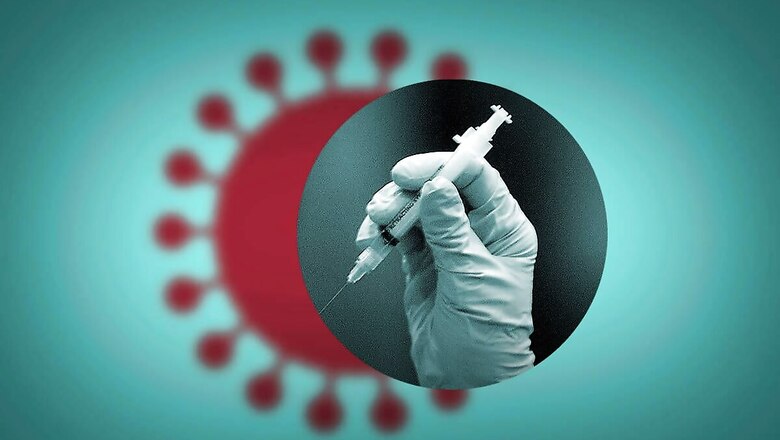
views
On Thursday, Dr Anthony Fauci said that mutations will arise in greater numbers unless people are vaccinated. “This is a race between the virus and getting vaccines into people,” he said.
On February 16, the New Scientist reported that the UK and Californian mutant strains have merged, resulting in a potentially more concerning hybrid mutant. This “recombination” of two mutations detected in a sample from California and identified at the Los Alamos National laboratory in New Mexico is a first in this pandemic so far.
The Californian variant, B.1.429, is believed to render the virus more resistant to antibodies, and its fusion with Kent (UK) mutation, which gives the virus more transmissibility, could put the progress gained through vaccination and natural immunity back by a few steps.
According to Colin Furness, an epidemiologist teaching at the University of Toronto, for this “recombination” to happen, the two different strains of coronavirus need to appear in the same human cells and “swab large chunks of their genetic material” creating “large scale changes”.
This means that different mutant strains of the virus can infect the same individual at the same or different times, which raises question about the effectiveness of antibodies previously generated.
The natural question then arises is the effectiveness of vaccines currently on ground and being developed as we speak.
ALSO READ| Rise of the Mutants: India’s Covid-19 Battle Far From Over, Fresh Surge Could Be Just Around the Corner
On Thursday, an article in British press highlighted the plight of a city in Eastern Cape province of South Africa, where the South African mutant has extensively spread. Port Elizabeth, a small city, has seen a huge population of adults succumb to coronavirus. As a result, a large number of children have been displaced and orphaned.
Do we need booster doses?
Another viewpoint which is now gaining ground among the scientific community across the world is that just like Influenza or common cold, we might need booster doses for coronavirus at periodic intervals. This may be required due to two reasons—first, the immunity formed against the virus might wane with time, and second, there will be constant drift mutations, even if not significant variants of concerns (VoCs).
These boosters are, at the moment, being considered as an annual phenomenon. For some vaccines, boosters might not pose any significant problem, however, for some others like AstraZeneca, Sputnik V, Johnson & Johnson, this could create problems in future. This is because all these vaccines contain another live virus, usually an adenovirus, as a vector to carry the coronavirus genetic material, to be injected into the human body. While the purpose of the exercise is to prime the human body to develop antibodies against the genetic material of COVID-19, and that it does, what we are missing is that the adenovirus itself is an antigen, even though its role may just be of the carrier.
It is a concerning possibility that the human body may, with time, start recognizing this vector as an “enemy antigen” and develop antibodies against it. If such a thing happens, the body will start destroying the vector itself when boosters are injected, thereby leading to vaccine failures.
As per Bodo Plachter, Deputy Director of the Institute of Virology at Mainz University, Germany, this is a very plausible scenario in near future. This could then mean that the vaccines developed by Moderna and Pfizer which use a different technology, namely the mRNA platform, will have an edge as they would be protected from such a phenomena. Similarly, vaccine developed by Sinovac, which use deactivated coronaviruses, or Novavax, which is using spike proteins, will again escape this kind of vaccine rejection by the body. Moderna and Pfizer-BioNTech have said in separate statements this week that they are studying additional booster doses in order to target the variants.
In a yet another development, the UK government has funded a study combining Oxford-AstraZeneca’s vaccine with Sputnik V. One of the questions this study will try to answer is the concern over vector-immunity. As per Matthew Snape, a vaccinologist at Oxford, this study will look at “how well a viral vector performs versus an alternative vaccine when given as a third dose”.
How does it affect India?
As of now, the two principle vaccines in India are Covishield and Covaxin. Covishield is an AstraZeneca vaccine based on an adenovirus vector so any potential pitfalls of AstraZeneca vaccine will apply to Covishield.
Covaxin, on the other hand, is based on inactivated coronavirus, without using any additional vector. Although Covaxin has not had any Phase-3 trials before launch, the data generated from vaccination of Indian population and in other countries as a part of Vaccine Maitri has started to fill in for this. As per Bharat Biotech, which has developed Covaxin along with the Indian Council of Medical Research (ICMR) and the National Institute of Virology (NIV), they have collected data from nearly 25,800 persons, making this the largest multicentre phase-3 trial in India, and the efficacy results could be available as early as end of this month.
ALSO READ| Barely Months into World’s Biggest Vaccine Drive Against Covid-19, Fault Lines Have Started to Appear
In anticipation of results, Brazil, whose variant P.1 has been drawing a lot of concern, has placed an order of 20 million doses of Covaxin. This has come at the same time when Brazil crossed the grim figure of 2,50,000 deaths this week. Apart from P.1, Brazil is also monitoring another mutant, P.2, identified in Rio de Janeiro.
Unfortunately, Pfizer Inc. has withdrawn its application for emergency use authorization of its vaccine in India. However, Tata Medical & Diagnostics and Council for Scientific and Industrial Research (CSIR) are believed to be in talks with Moderna to launch trials of their vaccine on Indian population.
Whether or not it would be better to focus efforts on the class of vaccines which do not depend on live viral vectors, only time can tell.
(This article is the third in a series on Covid-19 and vaccines by the author. The previous articles can be read here and here)
Read all the Latest News, Breaking News and Coronavirus News here

















Comments
0 comment